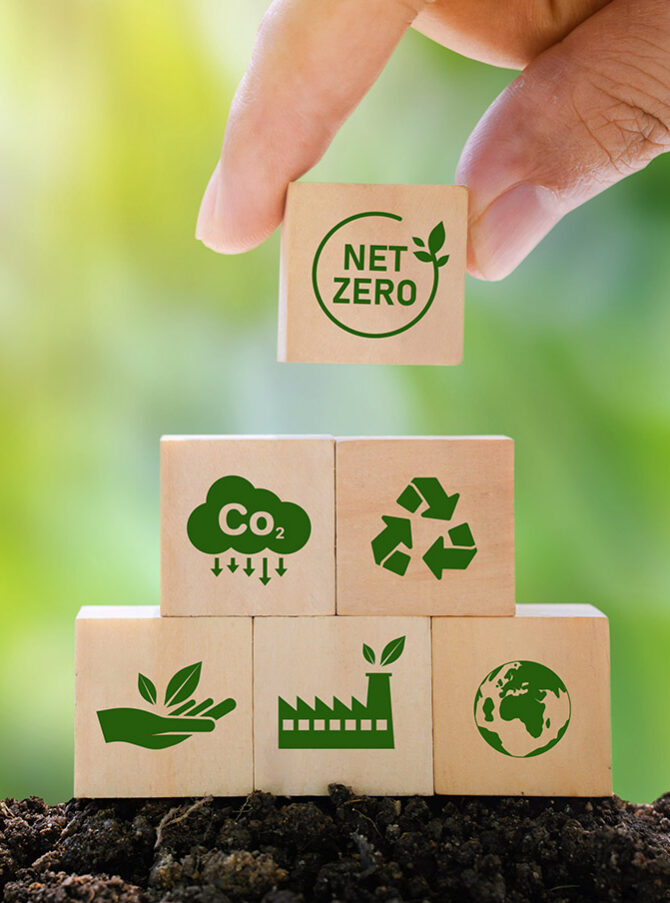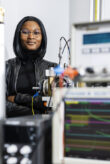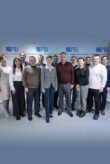In November 2022, an exciting new PTB international cooperation project, Quality Standards for Increased Trade in the Eastern Partnership Countries, was launched. The virtual kick-off event was attended by 97 participants from across Europe and the South Caucasus.
Corinna Weigelt, Head of PTB’s Europe and the CIS Section, opened the new project’s high-energy kick-off event. This project is funded by the German Federal Ministry for Economic Cooperation and Development (BMZ). It will run for three years and involves working with the five Eastern Partnership countries of Armenia, Azerbaijan, Georgia, Moldova, and Ukraine. In addition, it is building on three prior PTB projects of the region that were recently completed. As soon as the participants in the virtual kick-off event started greeting each other before the meeting was official opened, one thing became obvious. The previous PTB projects had laid a solid foundation for future collaboration. Strong connections had been built, the partners have trust in each other, and they are greatly looking forward to working together again.
The project coordinators, Kathleen Richter and Stefan Wallerath, introduced the new Eastern Partnership project in greater detail. This new project will adopt a demand-driven approach that focuses on the QI* system as a whole. It is concentrating on the needs of the end users of QI services. And it is examining how standardisation, metrology, accreditation, and conformity assessment – the various components of the QI system – work together to increase productivity and innovation for businesses. The green transformation and digitalisation are two cross-cutting themes that will aslo guide the selection of project activities. While many of the project activities are still in planning, the first outlines of the project are already shaping up. The launch of the project will see the Calidena methodology https://www.calidena.ptb.de/ being applied. Calidena means to select a value chain significant for economic development and the green transformation and will bring together stakeholders from QI institutions and the private sector. Together they can identify gaps in the QI services and develop roadmaps for addressing them.
Given the different levels of development of QI institutions in the region as well as the varying needs of the private sector, project activities will be targeted primarily at national level to ensure relevance to local conditions. In line with this approach, different value chains will be selected in each of the partner countries. Armenia, for example, sees economic potential in greening its pharmaceutical sector, whereas Moldova is interested in applying European environmental and other standards to its low-voltage electrical equipment. The regional component of the project will be used to share and expand the experiences gained bilaterally to neighbouring countries.
To highlight the alignment between the project and the political priorities of the EU and Germany, keynote speakers were invited to the kick-off event. Viola von Cramon‑Taubadel, Member of the European Parliament from the German Green Party, presented an overview of the European Green Deal. She explained its sectoral scope and funding mechanisms, as well as its importance for cooperating with the Eastern Partnership countries. Heike Backofen‑Warnecke, Head of the South-Eastern and Eastern Europe, South Caucasus Division of the BMZ, added the German perspective on the green transformation and digitalisation. She also addressed the opportunities that regional collaboration will bring to dealing with common challenges. PTB’s own Frank Lienesch, Head of the Division for Legal and International Metrology, outlined how PTB is supporting the national and EU priorities with work ranging from electromobility and hydrogen economy to digitalisation for smart cities. Karen Darbinyan, Quality Manager of Grand Candy – an Armenian food company – rounded up the input from the perspective of an implementing partner country. He provided a positive example of a business from a partner country transitioning to using alternative energy sources at its facilities. These green sources of power include solar energy and bioethanol that is produced from byproducts and expired goods as a substitute for diesel.
Following the input, representatives of QI institutions from Armenia, Azerbaijan, Georgia, Moldova, and Ukraine celebrated the start of their cooperation project with PTB. They shared their enthusiasm and stated their commitment to its implementation. The positive and constructive energy for the project was palpable despite the physical distance between the participants in the virtual kick-off event.
Copyright Image: iStock
*QI stands for quality infrastructure








